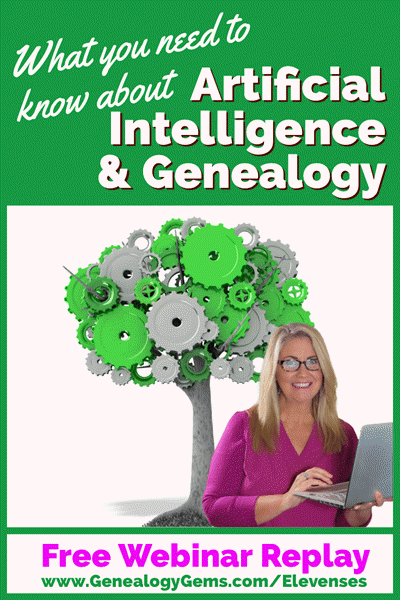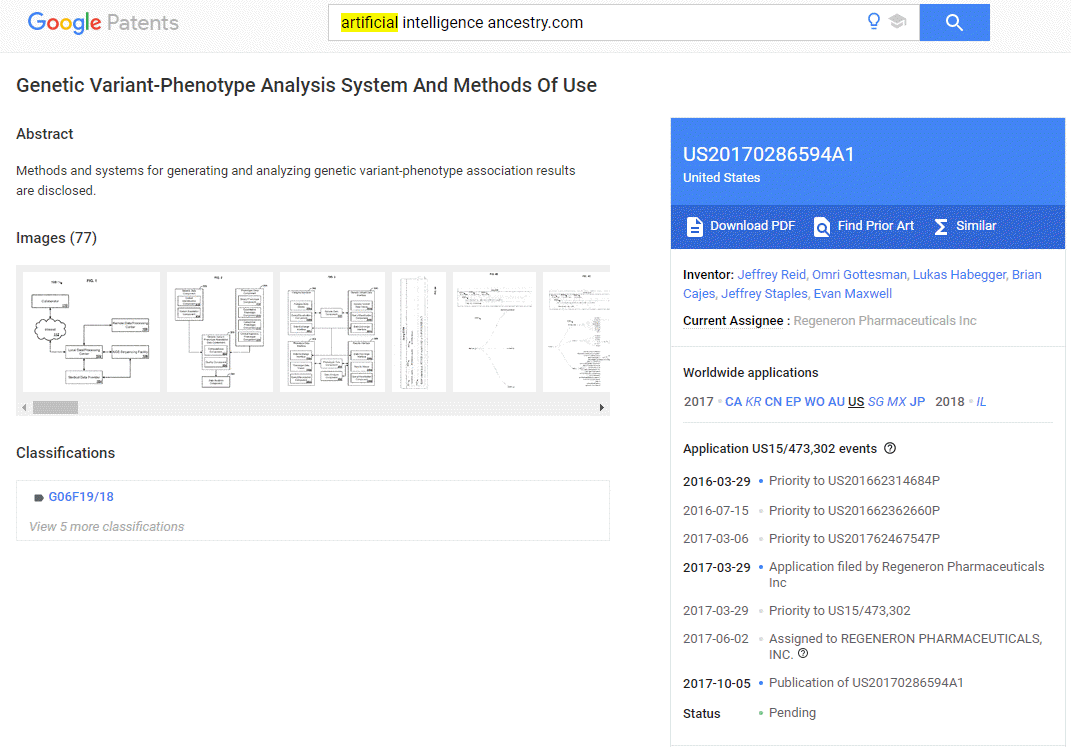How Artificial Intelligence AI and Machine Learning Impact Genealogy
Artificial Intelligence and Genealogy
Elevenses with Lisa Episode 32
In this episode we tackle a few small geeky tech questions about artificial intelligence, better known as AI, that may have a pretty big impact on your genealogy life. Questions like:
- Is artificial intelligence the same thing as machine learning?
And if not how are they related? - And am I using AI, maybe without even being aware of it?
- And what impact is AI really having on our lives? Is it all good, or are there some pitfalls we need to know about?
We’re going to approach these with a focus on family history, but pretty quickly I think we’ll discover it’s a much more far-reaching subject. And that means this episode is for everyone.

Watch the free video below.
While I’ve done my own homework on this subject and written about it in my book The Genealogist’s Google Toolbox, I’m smart enough to call in an expert in the field. So, my special guest is Benjamin Lee. He is the developer of the Newspaper Navigator, the new free tool that uses artificial intelligence to help you find and extract images from the free historical newspaper collection at The Library of Congress’ Chronicling America. I covered Newspaper Navigator extensively in Elevenses with Lisa episode 26.
Ben is a 2020 Innovator-in-Residence at the Library of Congress, as well as a third year Ph.D. Student in the Paul G. Allen School for Computer Science & Engineering at the University of Washington, where he studies human-AI interaction with his advisor, Professor Daniel Weld.
He graduated from Harvard College in 2017 and has served as the inaugural Digital Humanities Associate Fellow at the United States Holocaust Memorial Museum, as well as a Visiting Fellow in Harvard’s History Department. And currently he’s a National Science Foundation Graduate Research Fellow.
Thank you so much to Ben Lee for a really interesting discussion and for making Newspaper Navigator available to researchers. I am really looking forward to hearing from him about his future updates and improvements.
Artificial Intelligence and Genealogy
Covering technology and its application to genealogy is always a bit of a double-edged sword. It can be exciting and helpful, and also problematic in its invasiveness.
Tools like family tree hints, the Newspaper Navigator and Google Lens (learn more about that in Elevenses with Lisa episode 27) all have a lot to offer our genealogy research. But on a personal level, you may be concerned about the long reaching effects of artificial intelligence on the future, and most importantly your descendants. In today’s deeply concerning cancel culture and online censorship, AI can seriously impact our privacy, security and even our freedom.
As I did my research for this episode I discovered a few things. Artificial Intelligence and machine learning is having the same kind of massive and disrupting impact that DNA has had on genealogy, with almost none of the same publicity. (For background on DNA data usage, listen to Genealogy Gems Podcast episode 217. That episode covers the use of DNA in criminal cases and how our data potentially has wide-reaching appeal to many other entities and industries.)
A quick search of artificial intelligence ancestry.com in Google Patents reveals that work continues on ways to apply AI to DNA and genealogy. (See image below)

Patent search result: a pending patent involving AI and DNA by Regeneron Pharmaceuticals, Inc.
AI now makes our genealogical research and family tree data just as valuable to others outside of genealogy.
This begs the question, who else might be interested in our family tree research and data?
Who Is Interested in Your Genealogy Data
One answer to this question is academic researchers. During my research on this subject The Record Linking Lab at Brigham Young University surfaced as just one example. It’s run by a BYU Economics Professor who published a research paper on their work called Combining Family History and Machine Learning to Link Historical Records. The paper was co-authored with a Notre Dame Economics and Women’s Studies professor.
In this example, their goals are driven by economic, social, and political issues rather than genealogy. Their published paper does offer an eye-opening look at the value that those outside the genealogy community place on all of the personal data we’re collecting and the genealogical records we are linking. Our work is about our ancestors, and therefore it is about ourselves. Even if living people are not named on our tree, they are named in the records we are linking to it. We are making it all publicly available.
In the past, historical records like birth and death, military and the census have been available to these researchers, but on an individual basis. This made them difficult to work with. Academic (and industry) researchers couldn’t easily follow these records for individual people, families, and generations of families through time in order to draw meaningful conclusions. But for the first-time machine learning is being applied to online genealogy research data making it possible to link these records to living and deceased individuals and their families.
It’s a lot to think about, but it’s important because it is our family history data. We need to understand how our data is being used inside and outside the genealogy sandbox.
Answers to Your Live Chat Questions About AI
One of the advantages of tuning into the live broadcast of each Elevenses with Lisa show is participating in the Live Chat and asking your questions.

www.GenealogyGems.com/Elevenses
From Linda J: What about all the “people search” sites (not genealogy) that have all, or a lot of, our personal date?
Lisa’s Answer: My understanding is that much of the information provided on many of the “people search” websites comes from public information. So while the information is much easier to access these days, it’s been publicly available for years. That information isn’t as accessible to projects like the one discussed in this episode because those websites don’t make their Application Programming Interface (known as API) publicly available like FamilySearch does.
From Doug H: Wouldn’t that potentially find errors in our trees?
Lisa’s Answer: Yes.
From Sheryl T: Do these academic researchers have access to the living people on the trees? Or are those protected from them as it is to the public?
Lisa’s Answer: They have access to all information attached to people marked as “Living Person.” Therefore, if the attached record names them, their identity would then be known. Click a hint on your tree at Ancestry for example, and the found records clearly spell out the name of the person they believe is your “Living” person.
From Nancy M: How long do the show notes stay available? am looking for Google Books two weeks ago and last week’s Allen Co Library.
Lisa’s Answer: The show notes remain available until the episode is archived in Premium Membership. You can find all of the currently available free Elevenses with Lisa episodes on our website in the menu under VIDEOS click Elevenses with Lisa.
Nannie A: I heard a rumor that Ancestry .com has been sold. Do you know if that’s true?
Lisa’s Answer: Yes, they were sold again this year. Read:
Private equity firm Blackstone Group Inc. buying Ancestry.com for $4.7 billion
Private equity wants to own your DNA by CBS News.
Resources
Get My Free Genealogy Gems Newsletter – click here.
Bonus Download exclusively for Premium Members: Download the show notes handout.
Become a Genealogy Gems Premium Member today.
